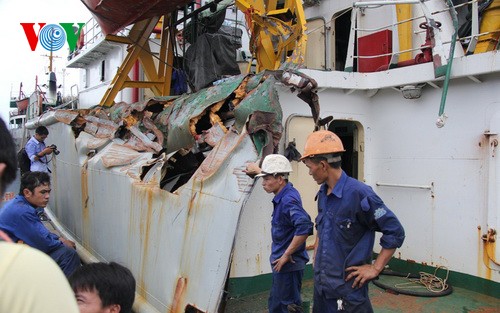(VOVworld) – China’s unreasonable sovereignty claims in the East Sea have damaged China’s relationship with other countries. Beijing has prompted the world to change its view of a peaceful rising China.

A Chinese ship hit a ship of Vietnam's fishery resources surveillance force |
With oil rig Haiyang 981’s placement in Vietnam’s exclusive economic zone still a fresh topic in international newspapers, China has once again surprised the world community by re-drawing its map to claim sovereignty over most of the East Sea.
China’s 9-dash line map published in 2009 was not recognized internationally. Its new 10-dash line map has stirred a global backlash because of its aggressive defiance of international law. The publication of the new map has drawn more public attention to the East Sea situation. Political analysts say China’s hegemonic ambitions have created an unexpected backlash against China.
Inconsistency between speaking and acting
China has insisted on unilaterally resolving disputes in the East Sea without any third-party interference or internationalizing of the issue. After many requests for bilateral talks to resolve the East Sea issue but receiving no responses from China, Vietnam submitted to the UN a diplomatic note protesting China’s violation. This move has received enormous support at home and abroad.

Vietnam's KN 951 ship was rammed and seriously damaged by Chinese ships |
To counter with Vietnam’s resolute attitude and strong criticism from the global community, China hastily sent documents to the UN accusing Vietnam of provoking China and blocking its activities in the East Sea. China accused Vietnam of sending fishing boats to ram Chinese ships 1,416 times. Vietnam has overwhelming evidence of China’s aggressive actions in the East Sea, but China has nothing to prove it was a victim other than inconsistent verbal statements. While China was making up bogus scenarios of Vietnamese boats attacking Chinese ships, Vietnam published in the mass media actual photos and video clips made at the site of the conflict. Global newspapers repeated well-documented stories of China’s deplorable and aggressive actions in the East Sea.
China’s prestige is seriously deteriorating
By refusing all opportunities for dialogue and by speaking and acting inconsistently, China has seriously damaged its own prestige. In 2012, China succeeded in preventing ASEAN from issuing a joint statement on the Philippine’s dispute with China over the Scarborough Shoal. When it violated Vietnam’s sovereignty, China expected to repeat its success in dividing ASEAN.
Unexpectedly, ASEAN showed unity and consensus on the East Sea dispute. Peace, security, safety, freedom of navigation, not using force to resolve disputes, abiding by international law and ASEAN agreements have guided ASEAN’s stance. During a meeting with Chinese President Xi Jinping in Beijing in May, Myanmar President Thein Sein made it clear that Myanmar would back ASEAN in the East Sea dispute despite China’s intimation that it was hoping for Myanmar’s support.
Difficult to regain trust
The more aggressive China becomes, the faster its prestige erodes. By placing an oil rig in Vietnam’s waters, ignoring the Philippine’s suit against China, and boldly announcing its sovereignty over other countries’ marine territory, China has pushed ASEAN countries to cooperate with the US. That’s exactly what China doesn’t want, because it will give the US an advantage in realizing pivot to Asia.
The greatest loss, however, is China’s prestige. China’s aggressive expansion attempts have made Chinese leaders’ statements about “China’s peaceful rise” or “No Gene for Invasion in Chinese People's Blood” sound like a bad joke.